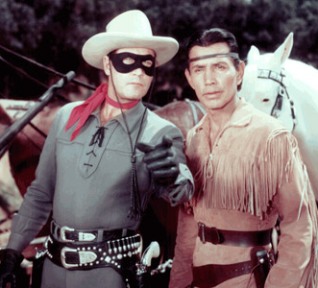There’s a lot of “buzz” surrounding the new Batman summer movie.
One aspect that critics point to is the film’s faithfulness to the original concept of a dark and mysterious character committed to fighting injustice — a departure from the over-the-top cartoon characters present in earlier films.

However, before the Bat-man’s appearance in 1939, before Superman debuted in ’38, another masked hero had already established himself as the foremost crime-fighter, and his name was the Lone Ranger.
In 1994, while researching my first book, “The Lone Ranger’s Code of the West,” I spent four days with Fran Striker, Jr., the son of the creator.
It still surprises me how few people know that an unassuming, imaginative writer from Buffalo, New York created, developed, and wrote the Lone Ranger, Green Hornet, Sgt. Preston of the Yukon, and many other characters. Fran Striker literally wrote thousands of radio shows, novels, and comics featuring these characters, in addition to overseeing the production of records, films, and television treatments.
Fran, Jr. shared many stories about his father, most if not all, reflecting his loyalty to friends, his compassion toward others, and his integrity as a human being. “To those who listened to his thrice-weekly radio broadcasts,” Striker, Jr. said, “[the Lone Ranger] was clean living and goodness. He was justice for all. He was the personification of those traits of character that every parent hopes their child will possess, when grown… But to me, all of those admirable traits of character given to the Ranger were so familiar, so recognizable….”
The Lone Ranger was an amalgam of characters and characteristics. Radio station WXYZ owner George W. Trendle contacted Striker to work up a radio character that would not only be entertaining to kids, but teach them right from wrong by way of a code of ethical values.
I found this intriguing. I had never heard of a character created specifically around a set of core, ethical values. Other western characters would follow, many with their own codes. Gene Autry had his Cowboy Code, Hopalong Cassidy offered up his Creed and Roy Rogers had his Riders Club Rules. But the Lone Ranger predates them all.
Working with the younger Striker and many of his father’s early scripts, I discovered many plots and statements made by the “daring and resourceful masked rider” covering issues of honesty, fairness, caring, respect, loyalty, tolerance, duty and moral courage.
On the last day I spent with Fran, I noticed a small piece of paper, set in a simple, wooden frame. When I asked Fran about it, he smiled and told me that it was something that had sat on his dad’s desk for years. It was the senior Striker’s philosophy, a code by which he lived. Fran called it “The I Believes.” Not long after the Lone Ranger appeared on radio, Striker’s Code would become familiar to hundreds of thousands of kids and adults as The Lone Ranger Creed:
“I believe…
“…that to have a friend, a man must be one.
“…that all men are created equal and that everyone has within himself the power to help make this a better world.
“…that God put the firewood there, but every man must gather and light it for himself.
“…in being prepared physically, mentally, and morally to fight when necessary, for that which is right.
“…that a man should make the most of what he has.
“…that “this government, of the people, by the people, and for the people,” shall live always.
“…that man should live by the rule of what is best for the greatest number.
“…that sooner or later, somewhere, somehow, we must settle with the world and make payment for what we have taken.
“…that all things change but truth and that truth alone lives on forever.
“…in my creator, my country, and my fellow man.”
– Fran Striker
So synonymous with honesty and fair play in the popular culture, that television’s Lone Ranger, Clayton Moore’s mere presence was enough to settle any dispute. Click to hear a classic and true story from Late Night with David Letterman.
Comments









